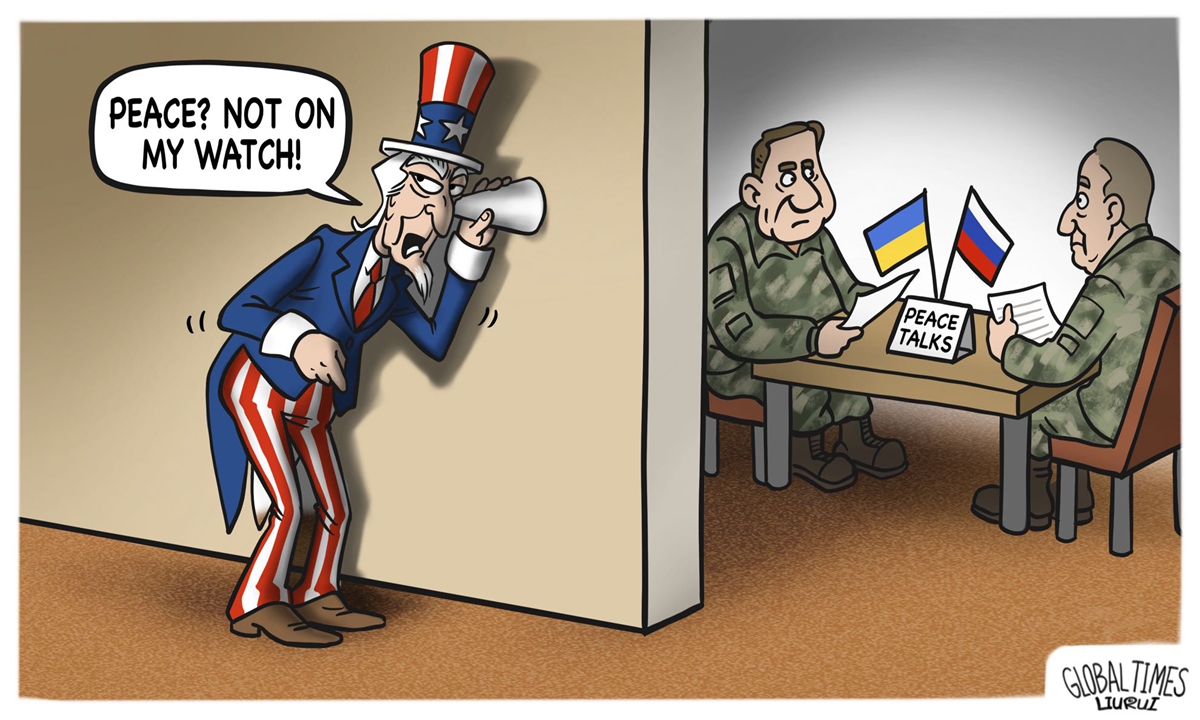
Peace talks Illustration: Liu Rui/GT
The Russia-Ukraine conflict has not yet seen a peaceful turnaround, but has reached a stage when war in eastern Ukraine is "imminent." According to media reports, both Russia and Ukraine are amassing troops in the Donbass region of eastern Ukraine in recent days, and the largest-scale battle since the conflict may break out. "We [Ukraine] predict that active combat operations will begin any time soon," a spokesman for Ukraine's defense ministry, Oleksandr Motuzyanyk, said on Monday. After visiting Moscow on Monday, Austrian Chancellor Karl Nehammer said he is "rather pessimistic" toward the situation between Russia and Ukraine.
Once the war breaks out, it would be a predictable tragedy in eastern Ukraine. Analysts said that hundreds of thousands of people will participate in the war from both sides. After completing the main tasks of the first stage of the "special military operation," Russia will focus on "liberating" Donbass, analysts believed. Ukrainian President Volodymyr Zelensky's adviser Mykhaylo Podolyak said recently that "Ukraine is ready for big battles. Ukraine must win them, including in Donbass. And once that happens, Ukraine will have a more powerful negotiating position." There is also a view that, with the two sides' military power in the region almost "evenly matched," the war could be bloody, even comparable to World War II.
However, it should also be noted that despite the imminent outbreak of war in eastern Ukraine, the hope of peace talks has not been completely lost. Russian Foreign Minister Sergei Lavrov said on Monday that he saw no reason not to continue talks with Ukraine despite Ukraine's inconsistency. Zelensky also said that Ukraine is "ready to simultaneously fight and look for diplomatic ways to put an end to this war." Nehammer also said that the one glimmer of hope was Russian President Vladimir Putin's continued interest in the Istanbul peace talks.
Objectively speaking, the current situation is a bit difficult for both Russia and Ukraine. Given the lack of mutual trust between Russia and Ukraine, the international community needs to protect the willingness of the two sides for peace talks. Blindly imposing sanctions and sending weapons will not only deepen the hostility between the two sides, but may also lead to their serious strategic misjudgments.
Regrettably, the US, the initiator of the Ukrainian crisis, keeps sending arms to Ukraine. The Pentagon said that the $2.4 billion military aid provided to Kiev since the Biden administration came to office is almost equal to Ukraine's defense budget. The NATO secretary-general has called on member states to drop the distinction between defensive and offensive weapons when supplying weapons to Ukraine. Since the conflict between Russia and Ukraine started, the two sides have been pushed to the "decisive battle" step by step, and the way out has been almost cut off by the US and NATO.
In the previous rounds of peace talks between Russia and Ukraine, Washington's attitude was not so much cautious as it was pouring cold water. US media have reported the possibility that Zelensky may adopt a "neutral" status with the West has "caused heartburn for US officials." There are indications that Washington does not want to see progress in the peace talks and has prevented a diplomatic solution to the conflict. If Washington denies this and wants to prove that it is not a "warmonger," it should have a direct dialogue with Russia. After all, whoever started the trouble should end it.
The conflict between Russia and Ukraine has caused huge losses to all parties: The World Bank has predicted that Ukraine's economy will almost be halved, and this does not include the negative impact of infrastructure damage; institutions predict that the Russian economy will shrink by 11.2 percent in 2022; EU countries are facing pressure such as huge inflation, energy shortages, and an influx of refugees. The growth expectations for the eurozone have also been lowered. In addition, a major humanitarian crisis is exacerbating. The war is not over yet, but the situation in which all parties are losers has emerged - except for the forces that take advantage of the chaos.
Russia-Ukraine conflicts have come to a dangerous juncture. Should we allow hostility to escalate and lead to more intense conflicts, or should we actively build bridges for peace and create all possible opportunities for peace talks? For all forces in the international community that do not want a large-scale humanitarian crisis, this deserves to be considered calmly, seriously and prudently.
Before the situation develops to the worst state, there is still room for all parties to do something. They should build "bridges" to "give peace a chance," and must not wait for the outbreak of a war.




